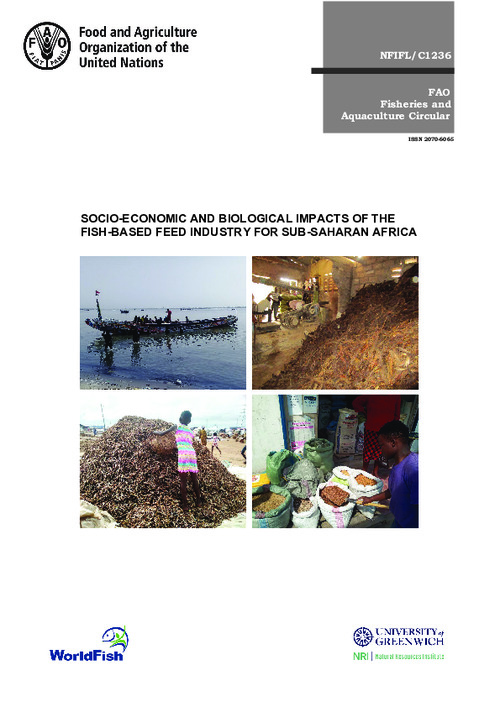Socio-economic and biological impacts of the fish-based feed industry for sub-Saharan Africa

As populations grow and urbanize, demand also increases for animal-source foods, including farmed livestock and fish, and for feed products that can include fish-derived ingredients. Low- and middle-income countries are increasingly concerned about the fish-derived ingredient and fish-based feed industry, as many of the fish species used for fish-derived ingredients and fishbased feed production are important for communities as a source of livelihoods and food and nutrition security. Improved understanding of the fish-based feed industry, its stakeholders and the associated livelihood activities is timely to determine how
these products fit in food systems that are transforming to more equitable and sustainable configurations. With the increase in the number and intensity of demands on these species comes concern for all aspects of sustainability, and trade-offs and opportunities that are experienced by different stakeholders. The objective of this study was to understand the drivers, outcomes and trade-offs of the fish-based feed industry for sub-Saharan Africa, focusing on nine countries (the Congo, the Gambia, Ghana, Malawi, Mauritania, Senegal,
Sierra Leone, Uganda and United Republic of Tanzania). The study used various information sources and mixed methods for data collection and analysis, including a desk review of published and unpublished reports and data sets as well as country surveys consisting of background data collection, key informant interviews (n = 122) and focus group discussions (n = 642)) which contributed to a stakeholder Delphi assessment (an iterative process of asking questions to identify preferences and trends amongst stakeholders). The study found that fish-based feeds are mainly exported, offering some economic benefits to governments and fishworkers throughout the value chain. At the same time, however, respondents
suggested the industry constitutes a threat to the livelihoods and food and nutrition security of local communities. Looking to the future, stakeholders identified a range of actions that are required to ensure that the fish-based feed industry contributes to equitable social and economic development, nutritional benefits and environmental sustainability. The study prioritized these recommendations for decision-making and future research and these included the establishment of and/or compliance with regulations for environmentally friendly and healthy/safe fish-derived ingredients and fish-based feed production, as well as
continued efforts to identify and promote alternative efficient to use feed products that do not rely (or rely less on) fish-based ingredients.
Permalink
Date Available
Type
Countries
ISSN
2070-6065
Copyright
CC-BY-NC-SA-4.0
Research Themes
Language